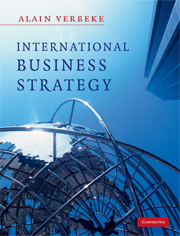Book contents
- Frontmatter
- Contents
- List of figures
- List of case studies
- About the author
- Foreword
- Acknowledgements
- List of abbreviations
- Walkthrough
- Introduction and overview of the book's framework
- Part I Core concepts
- Part II Functional issues
- Part III Dynamics of global strategy
- Conclusion. The true foundations of global corporate success
- Appendix: Suggested additional readings
- Index
Appendix: Suggested additional readings
- Frontmatter
- Contents
- List of figures
- List of case studies
- About the author
- Foreword
- Acknowledgements
- List of abbreviations
- Walkthrough
- Introduction and overview of the book's framework
- Part I Core concepts
- Part II Functional issues
- Part III Dynamics of global strategy
- Conclusion. The true foundations of global corporate success
- Appendix: Suggested additional readings
- Index
Summary
Below, I have selected one substantive additional reading for each chapter in the book. I based my selection on the criterion that each reading should convey a truly important message (or series of messages) complementing the chapter's storyline. The readings provide understanding critical to managerial practice in the international business strategy sphere. I have tried to be eclectic in my selection. In some cases the additional reading is more academically grounded; in other cases it is more immediately practice oriented. But the reading's main purpose is always the same: allowing the student of international business strategy to learn beyond the present book, thereby further sharpening the mind about the topic she or he is passionate about.
Chapter 1: Dunning, J. H. and Lundan, S. (2008). Multinational Enterprises and the Global Economy, 2nd edn, Cheltenham: Edward Elgar.
Dunning and Lundan's volume complements the present book in two important ways. First, it provides an overview of the environment of multinational enterprises, with much attention devoted to the world wide picture of foreign direct investment and business–government interactions. Second, it addresses in great detail the wide variety of impacts MNEs have on society. Dunning and Lundan's volume is by far the most detailed account of multinational enterprise activity ever written.
Chapter 2: Szulanski, G. (2003). Sticky Knowledge: Barriers to Knowing in the Firm, London: Sage Publications.
- Type
- Chapter
- Information
- International Business StrategyRethinking the Foundations of Global Corporate Success, pp. 461 - 466Publisher: Cambridge University PressPrint publication year: 2009



